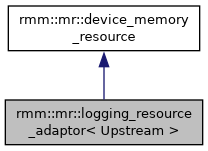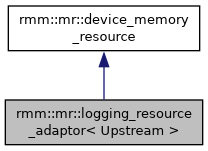使用 Upstream 分配内存并记录请求的分配/解除分配信息的资源。 更多...
#include <logging_resource_adaptor.hpp>


公有成员函数 | |
| logging_resource_adaptor (Upstream *upstream, std::string const &filename=get_default_filename(), bool auto_flush=false) | |
构建一个新的日志记录资源适配器,它使用 upstream 来满足分配请求,并将每次分配/解除分配的信息记录到 filename 指定的文件。 更多... | |
| logging_resource_adaptor (Upstream *upstream, std::ostream &stream, bool auto_flush=false) | |
构建一个新的日志记录资源适配器,它使用 upstream 来满足分配请求,并将每次分配/解除分配的信息记录到 stream 指定的输出流。 更多... | |
| logging_resource_adaptor (Upstream *upstream, std::initializer_list< rapids_logger::sink_ptr > sinks, bool auto_flush=false) | |
构建一个新的日志记录资源适配器,它使用 upstream 来满足分配请求,并将每次分配/解除分配的信息记录到 stream 指定的输出流。 更多... | |
| logging_resource_adaptor (device_async_resource_ref upstream, std::string const &filename=get_default_filename(), bool auto_flush=false) | |
构建一个新的日志记录资源适配器,它使用 upstream 来满足分配请求,并将每次分配/解除分配的信息记录到 filename 指定的文件。 更多... | |
| logging_resource_adaptor (device_async_resource_ref upstream, std::ostream &stream, bool auto_flush=false) | |
构建一个新的日志记录资源适配器,它使用 upstream 来满足分配请求,并将每次分配/解除分配的信息记录到 stream 指定的输出流。 更多... | |
| logging_resource_adaptor (device_async_resource_ref upstream, std::initializer_list< rapids_logger::sink_ptr > sinks, bool auto_flush=false) | |
构建一个新的日志记录资源适配器,它使用 upstream 来满足分配请求,并将每次分配/解除分配的信息记录到 stream 指定的输出流。 更多... | |
| logging_resource_adaptor (logging_resource_adaptor const &)=delete | |
| logging_resource_adaptor & | operator= (logging_resource_adaptor const &)=delete |
| logging_resource_adaptor (logging_resource_adaptor &&) noexcept=default | |
| 默认移动构造函数。 | |
| logging_resource_adaptor & | operator= (logging_resource_adaptor &&) noexcept=default |
| 默认移动赋值运算符。 更多... | |
| rmm::device_async_resource_ref | get_upstream_resource () const noexcept |
| 到上游资源的 rmm::device_async_resource_ref。 更多... | |
| void | flush () |
| 刷新日志记录器内容。 | |
| std::string | header () const |
| 返回 CSV 头字符串。 更多... | |
 继承自 rmm::mr::device_memory_resource 的公有成员函数 继承自 rmm::mr::device_memory_resource 的公有成员函数 | |
| device_memory_resource (device_memory_resource const &)=default | |
| 默认拷贝构造函数。 | |
| device_memory_resource (device_memory_resource &&) noexcept=default | |
| 默认移动构造函数。 | |
| device_memory_resource & | operator= (device_memory_resource const &)=default |
| 默认拷贝赋值运算符。 更多... | |
| device_memory_resource & | operator= (device_memory_resource &&) noexcept=default |
| 默认移动赋值运算符。 更多... | |
| void * | allocate (std::size_t bytes, cuda_stream_view stream=cuda_stream_view{}) |
分配大小至少为 bytes 的内存。 更多... | |
| void | deallocate (void *p, std::size_t bytes, cuda_stream_view stream=cuda_stream_view{}) |
解除分配 p 指向的内存。 更多... | |
| bool | is_equal (device_memory_resource const &other) const noexcept |
| 将此资源与另一个资源比较。 更多... | |
| void * | allocate (std::size_t bytes, std::size_t alignment) |
分配大小至少为 bytes 的内存。 更多... | |
| void | deallocate (void *p, std::size_t bytes, std::size_t alignment) |
解除分配 p 指向的内存。 更多... | |
| void * | allocate_async (std::size_t bytes, std::size_t alignment, cuda_stream_view stream) |
分配大小至少为 bytes 的内存。 更多... | |
| void * | allocate_async (std::size_t bytes, cuda_stream_view stream) |
分配大小至少为 bytes 的内存。 更多... | |
| void | deallocate_async (void *p, std::size_t bytes, std::size_t alignment, cuda_stream_view stream) |
解除分配 p 指向的内存。 更多... | |
| void | deallocate_async (void *p, std::size_t bytes, cuda_stream_view stream) |
解除分配 p 指向的内存。 更多... | |
| bool | operator== (device_memory_resource const &other) const noexcept |
| 与另一个 device_memory_resource 的比较运算符。 更多... | |
| bool | operator!= (device_memory_resource const &other) const noexcept |
| 与另一个 device_memory_resource 的比较运算符。 更多... | |
静态公有成员函数 | |
| static std::string | get_default_filename () |
| 返回环境变量 RMM_LOG_FILE 的值。 更多... | |
详细描述
template<typename Upstream>
class rmm::mr::logging_resource_adaptor< Upstream >
使用 Upstream 分配内存并记录请求的分配/解除分配信息的资源。
可以使用现有的上游资源构建此资源的实例,以满足分配请求并记录分配/解除分配活动。
- 模板参数
-
Upstream 用于分配/解除分配的上游资源的类型。
构造函数与析构函数文档
◆ logging_resource_adaptor() [1/6]
|
inline |
构建一个新的日志记录资源适配器,它使用 upstream 来满足分配请求,并将每次分配/解除分配的信息记录到 filename 指定的文件。
日志文件将使用 CSV 格式写入。
如果 filename 已存在,则清除其内容。
创建多个使用相同 filename 的 logging_resource_adaptor 将导致未定义行为。
- 异常
-
rmm::logic_error 如果 upstream == nullptrspdlog::spdlog_ex 如果打开 filename失败
- 参数
-
upstream 用于分配/解除分配设备内存的资源 filename 要写入日志信息的文件名。如果未指定,则从环境变量 "RMM_LOG_FILE" 中获取文件名。 auto_flush 如果为 true,则对每次分配/解除分配都刷新日志。警告:这会降低性能。
◆ logging_resource_adaptor() [2/6]
|
inline |
构建一个新的日志记录资源适配器,它使用 upstream 来满足分配请求,并将每次分配/解除分配的信息记录到 stream 指定的输出流。
日志文件将使用 CSV 格式写入。
- 异常
-
rmm::logic_error 如果 upstream == nullptr
- 参数
-
upstream 用于分配/解除分配设备内存的资源 stream 用于写入日志信息的输出流。 auto_flush 如果为 true,则对每次分配/解除分配都刷新日志。警告:这会降低性能。
◆ logging_resource_adaptor() [3/6]
|
inline |
构建一个新的日志记录资源适配器,它使用 upstream 来满足分配请求,并将每次分配/解除分配的信息记录到 stream 指定的输出流。
日志文件将使用 CSV 格式写入。
- 异常
-
rmm::logic_error 如果 upstream == nullptr
- 参数
-
upstream 用于分配/解除分配设备内存的资源 sinks 将写入日志输出的日志记录接收器列表。 auto_flush 如果为 true,则对每次分配/解除分配都刷新日志。警告:这会降低性能。
◆ logging_resource_adaptor() [4/6]
|
inline |
构建一个新的日志记录资源适配器,它使用 upstream 来满足分配请求,并将每次分配/解除分配的信息记录到 filename 指定的文件。
日志文件将使用 CSV 格式写入。
如果 filename 已存在,则清除其内容。
创建多个使用相同 filename 的 logging_resource_adaptor 将导致未定义行为。
- 异常
-
spdlog::spdlog_ex 如果打开 filename失败
- 参数
-
upstream 用于分配/解除分配设备内存的 resource_ref。 filename 要写入日志信息的文件名。如果未指定,则从环境变量 "RMM_LOG_FILE" 中获取文件名。 auto_flush 如果为 true,则对每次分配/解除分配都刷新日志。警告:这会降低性能。
◆ logging_resource_adaptor() [5/6]
|
inline |
构建一个新的日志记录资源适配器,它使用 upstream 来满足分配请求,并将每次分配/解除分配的信息记录到 stream 指定的输出流。
日志文件将使用 CSV 格式写入。
- 参数
-
upstream 用于分配/解除分配设备内存的 resource_ref。 stream 用于写入日志信息的输出流。 auto_flush 如果为 true,则对每次分配/解除分配都刷新日志。警告:这会降低性能。
◆ logging_resource_adaptor() [6/6]
|
inline |
构建一个新的日志记录资源适配器,它使用 upstream 来满足分配请求,并将每次分配/解除分配的信息记录到 stream 指定的输出流。
日志文件将使用 CSV 格式写入。
- 参数
-
upstream 用于分配/解除分配设备内存的 resource_ref。 sinks 将写入日志输出的日志记录接收器列表。 auto_flush 如果为 true,则对每次分配/解除分配都刷新日志。警告:这会降低性能。
成员函数文档
◆ get_default_filename()
|
inlinestatic |
◆ get_upstream_resource()
|
inlinenoexcept |
到上游资源的 rmm::device_async_resource_ref
- 返回值
- 到上游资源的 rmm::device_async_resource_ref
◆ header()
|
inline |
返回 CSV 头字符串。
- 返回值
- 列名的 CSV 格式头字符串
◆ operator=()
|
defaultnoexcept |
默认移动赋值运算符。
- 返回值
- logging_resource_adaptor& 对被赋值对象的引用,类型为 logging_resource_adaptor&
本类的文档生成自以下文件